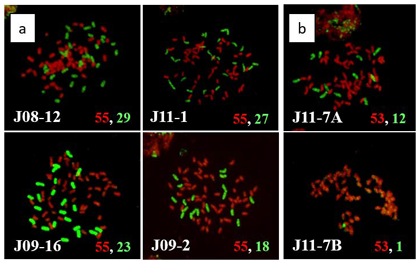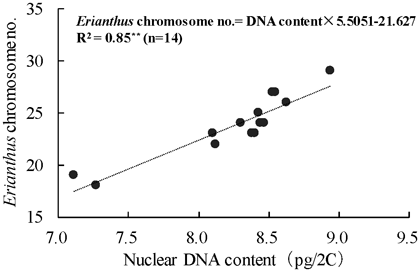Development of intergeneric F1 hybrids between sugarcane and Erianthus arundinaceus as a new sugarcane breeding material
Description
Sugarcane (Saccharum spp. hybrid) is an important crop for food and energy production, and further improvement of its productivity will contribute to promoting food sustainability and energy security around the world. However, its narrow genetic base has hindered the improvement of its productivity through breeding. For further improvement of sugarcane, broadening its genetic base by the introduction of new genetic resources is essential. Erianthus arundinaceus, a close relative, shows considerable potential as breeding material for sugarcane improvement owing to its high biomass productivity and exceptional adaptability to biotic and abiotic stresses. The aim of this study was to develop intergeneric F1 hybrids between sugarcane and E. arundinaceus, and to evaluate their cytogenetic and agronomic characteristics for their effective utilization in sugarcane breeding.
From crosses between Japanese sugarcane variety NiF8 (2n = 110, female) and E. arundinaceus (2n = 60, male), we identified 39 hybrids by amplification of 5S rDNA markers and 2 hybrids by morphological characteristics (Fig. 1). The number of Erianthus chromosomes in the hybrids varied from 18 to 29, even though “n + n” parental chromosome transmission occurred (Fig. 2). Some hybrids showed intra-clonal variation in Erianthus chromosome number between vegetatively propagated clones, and some hybrids could not be identified by 5S rDNA markers owing to the elimination of the Erianthus chromosomes with the 5S rDNA loci (Fig. 2). The number of Erianthus chromosomes in the intergeneric hybrids was strongly correlated with their DNA content, suggesting the possibility of estimating the number of Erianthus chromosomes in the hybrids from their DNA content (Fig. 3). Many hybrids showed “hybrid weakness” in yield-related characteristics, and their sucrose and fiber contents were comparable with the mid-parent values (Table 1). The number of Erianthus chromosomes in the hybrids was significantly positively correlated with some yield-related characteristics but not quality-related characteristics (Table 1). These hybrids showed high genetic coefficient of variance in agronomic characteristics, so the selection and utilization of hybrids with higher yields or higher sugar contents is possible (Table 1, Fig. 1).
The intergeneric F1 hybrids developed in this study provide new materials for broadening the genetic base of sugarcane. The detailed information on their cytogenetic and agronomic characteristics will contribute to effective utilization of Erianthus in sugarcane breeding.
Figure, table
-
Fig. 1. Growth of intergeneric hybrids between sugarcane and E. arundinaceus a: NiF8 (Saccharum spp. hybrid, female parent), b: J08-12 (intergeneric hybrid with no hybrid weakness), c: J11-14 (intergeneric hybrid with hybrid weakness), d: J09-2 (intergeneric hybrid selected by morphological characteristics). These pictures were taken on 8 May 2013 in the ratooning field at JIRCAS-TARF.
-
Fig. 2. GISH analysis of intergeneric hybrids
a: Variation of chromosome composition among hybrids. b: Variation of Erianthus chromosome number in vegetatively propagated clones of J11-7. J08-12, J11-1, J09-16 and J11-7 were screened by 5S rDNA but J09-2 was identified by morphological characteristics. Numbers in the bottom right corner indicate Saccharum (red) and Erianthus (green) chromosome number. -
Fig. 3. Correlation between the nuclear DNA content and Erianthus chromosome number in intergeneric hybrids
The data of 14 intergeneric hybrids with no intra-clonal variation in 5S rDNA sites were used. -
Table 1. Agronomic characteristics of intergeneric hybrids (New planting) Characteristic NiF8 JW4 Intergeneric hybrids Correlation with Erianthus chromosome no. (n=14) 2) Sugarcane Erianthus Average Min. Max. CVg (Female) (Male) (n=32) (n=32) (n=32) (n=23)1) Dry matter yield (g/stool) 1621.9 1419.3 591.0 40.3 1713.2 68.6 0.773* Number of stalks (no./stool) 6.4 43.4 10.8 1.0 22.1 40.2 0.336 Stalk length (cm) 119.5 64.8 67.6 15.0 125.8 39.5 0.457 Stalk diameter (mm) 21.8 10.7 12.1 5.9 16.6 17.4 0.697* Sucrose content (%) 17.8 3.1 8.5 2.3 18.0 20.4 0.418 Fiber content (%) 10.2 23.4 16.7 8.0 22.4 15.1 -0.409 The evaluation of agronomic characteristics was conducted at JIRCAS-TARF. The seedlings of 32 intergeneric hybrids were transplanted in the experimental field on 22 May 2012 and harvested between the 18 and 22 February 2013. Five stools per plot (2.8 m2) with three replicates placed according to a randomized block design were prepared for 23 intergeneric hybrids and the parental varieties. Six hybrids were replicated twice and three others only once due to difficulties with multiplication. 1): Analysis of the genetic coefficient of variance (CVg) were performed using data for the 23 hybrids for which three replicates were available. 2): The data of 14 intergeneric hybrids with no intra-clonal variation in 5S rDNA sites were used. *Significance at a 5% level.
- Affiliation
-
Japan International Research Center for Agricultural Sciences Tropical Agriculture Research Front
- Research project
- Program name
- Term of research
-
FY2018(FY2011-FY2020)
- Responsible researcher
-
Teraiima Yoshifumi ( Tropical Agriculture Research Front )
Takagi Hiroko ( Tropical Agriculture Research Front )
Pachakkil Babil ( Tokyo University of Agriculture )
Ohmido Nobuko ( Kobe University )
ORCID ID0000-0003-1496-6597KAKEN Researcher No.: 30343263Ebina Masumi ( Institute of Livestock and Grassland Science, NARO )
Irei Shin ( Okinawa Prefectural Agricultural Research Center )
Hayashi Hisayoshi ( University of Tsukuba )
KAKEN Researcher No.: 70251022 - ほか
- Publication, etc.
-
https://doi.org/10.1038/s41598-018-38316-6
Babil P et al. (2018) Scientific Reports, 9:1748
- Japanese PDF
-
A4366.83 KB
A3256.57 KB
- English PDF
-
A4184.06 KB
A3246.85 KB
- Poster PDF
-
2018_B06_poster.pdf295.78 KB



